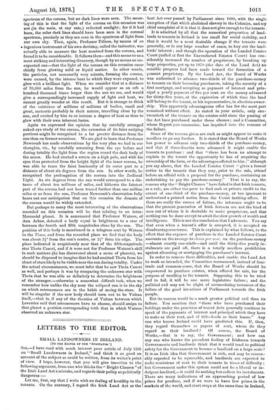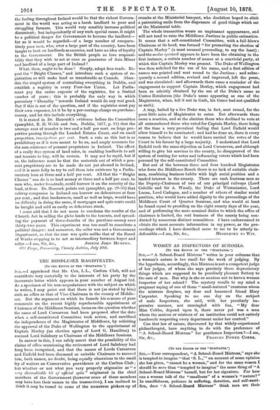LETTERS TO THE EDITOR.
• SMALL LANDOWNERS IN IRELAND.
[TO TOR EDITOR OF THR " EPROTATOR:1
SIR,-I have read with much interest your article of July 13th on "Small Landowners in Ireland," and think it as good an account of the subject as could be written, from its writer's point of view. I hope, however, that you will give insertion to the following argument, from one who thinks the" Bright Clauses "of the Irish Land Act a mistake, and regards their policy as politically dangerous :— Let me, first, say that I write with no feeling of hostility to the tenants. On the contrary, I regard the Irish Land Act as the
best Act ever passed by Parliament since 1688, with the single exception of that which abolished slavery in the Colonies, and my chief complaint of it is that it does not give enough to the tenants.
It is admitted by all that the numerical proportion of land- lords to tenants in Ireland is too small for social stability, and that it would be a most desirable change if the tenants were generally, or in any large number of cases, to buy out the land- lords' interest ; and though the operation of the Landed Estates Court (called at first the Encumbered Estates Court) has con- siderably increased the number of proprietors, by breaking up large properties, yet up to 1870 (the date of the Land Act) no sensible progress had been made toward the formation of a peasant proprietary. By the Land Act, the Board of Works was authorised to advance two-thirds of the purchase-money to tenants on their becoming purchasers, taking the security of a first mortgage, and accepting as payment of interest and prin- cipal a yearly payment of five per cent on the money advanced for thirty-five years, at the expiration of which time the land will belong to the tenant, or his representative, in absolute owner- ship. This apparently advantageous offer has for the most part remained without effect. As stated in your article, only one- twentieth of the tenants on the estates sold since the passing of the Act have purchased under those clauses ; and a Committee, whose Report you summarise, has inquired into the reasons of the failure.
Some of the reasons given are such as might appear to make it needless to go any further. It is stated that the Board of Works has power to advance only two-thirds of the purchase-money, and that if three-fourths were advanced it might enable the tenants to purchase ; and that "there has been no attempt to explain to the tenant the opportunity he has of acquiring the ownership of the farm, or the advantages offered to him ;" although you say above, that the Landed Estates Court "gives a formal notice to the tenants that they may, prior to the sale, attend before an official with a proposal for the purchase, containing an undertaking to pay the purchase-money." That is to say, the reasons why the " Bright Clauses" have failed is that Irish tenants, as a rule, are either too poor to find cash or private credit to the extent of one-third of the purchase-money, or too ignorant to understand a printed notice from the Court inviting offers. If these are really the causes of failure, the inference ought to be that the present generation of Irish farmers are not the kind of men out of whom it is desirable to make proprietors, and that nothing can be done except to await the slow growth of wealth and intelligence. This is not the conclusion that I advocate. You say that even when a tenant's offer is accepted, it is accepted on disadvantageous terms. This is explained by what follows, to the effect that the expense of purchase in the Landed Estates Court amounts on the average to eleven per cent. on the purchase-money —almost exactly one-ninth—and until the thirty-five yearly in- stalments are paid off, there is a totally needless prohibition against alienating or mortgaging the purchaser's interest.
In order to remove these difficulties, and enable the Land Act to work as intended, the Committee recommend, instead of free- trade and common-sense, that the Board of Works should be empowered to purchase estates, when offered for sale, for the purpose of reselling to the tenants. Supposing this to be tried and to fail, it will be one more legislative failure ; and the political evil may not be slight of accumulating instances of the failure of the good intentions of Parliament towards the Irish people.
But its success would be a much greater political evil than its failure. You mention that "those who have purchased their holdings under the provision of recent Acts generally continue to speak of the payments of interest and principal which they have to make as their rent, and of title-deeds as their leases." Any one who knows Ireland could have predicted this. If, then, they regard themselves as payers of rent, whom do they regard as their landlord ? Of course, the Board of Works,—that is to say, the Government ; and how can any one who knows the prevalent feeling of Irishmen towards Governments and landlords think that it would tend to political safety for the Government to become a landlord on a large scale ?
It is an Irish idea that Government is rich, and may be reason- ably expected to be squeezable, and landlords are expected to make remissions of rent to their tenants in times of difficulty ; but Government under this system could not be a liberal or in- dulgent landlord,—it could do nothing but collect its instalments.
There are many indications of an approaching period of low prices for produce, and if we were to have low prices in the markets of the world, and short crops at the same time in Ireland, the feeling throughout Ireland would be that the richest Govern- ment in the world was acting as a harsh landlord to poor and struggling farmers. This would very sensibly increase political discontent ; but independently of any such special cause, it might be a political danger for Government to become the landlord— for so it would be regarded—of a large number of compara- tively poor men, who, over a large part of the country, have been taught to look on landlords as enemies, and have no idea of loyalty to the Government. Do the British people so love responsi- bility that they wish to act at once as guarantor of Asia Minor and landlord of a large part of Ireland ?
What, then, ought to be done? Simply, adopt free-trade. Re- peal the "Bright Clauses," and introduce such a system of re- gistration as will make land as transferable as Consols. Aban- don the stupid system of centralising everything in Dublin, and establish a registry in every Poor-law Union. Let Parlia- ment pay the entire expense of the registries, for a limited number of years ; this is probably the only way in which pecuniary " liberality " towards Ireland would do any real good. But if this is out of the question, and if the registries must pay their own expenses, let it be by a per-centage charge on purchase- money, and let this include everything.
It is stated in Dr. Hancock's evidence before the Committee (pamphlet, R. D. Webb and Son, Dublin, 1877, p. 24) that the average cost of transfer is two and a half per cent. on large pro- perties passing through the Landed Estates Court, and on small properties, twenty-three per cent. Such a rate as this last is as prohibitory as if it were meant to be so, and amply accounts for the non-existence of peasant proprietors in Ireland. The effect of a really free system of land sales, in enabling landlords to sell and tenants to buy, will be certain. It may not be rapid, but if so, the inference must be that the materials out of which a pea- sant proprietary are to be made do not yet abound in Ireland, and it is mere folly to try to call them into existence by a Parlia- mentary loan at three and a half per cent. All that the "Bright Clauses" can do is to lend money at three and a half per cent, to men who, under free-trade, could borrow it on the security of the land, at four. Dr. Hancock points out (pamphlet, pp. 29-30) that railway companies in Ireland can borrow on debentures at four per cent., and that landowners, small as well as large, would have no difficulty in doing the same, if mortgages and quit-rents could be bought and sold as easily as debenture stock.
I must add that I do not mean to condemn the results of the Church Act in selling the glebe lands to the tenants, and spread- ing the payment of three-fourths of the purchase-money over thirty-two years. This experiment was too small to constitute a political danger; and moreover, the seller was not a Government Department, so that the case was quite unlike that of the Board of Works stepping in to act as intermediary between buyer and































 Previous page
Previous page